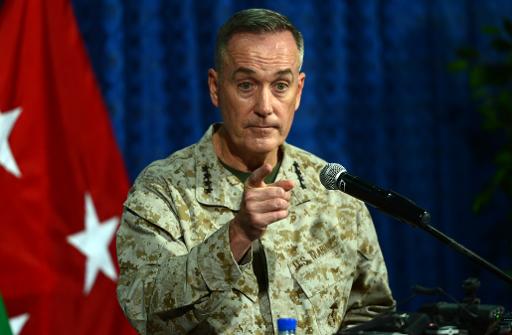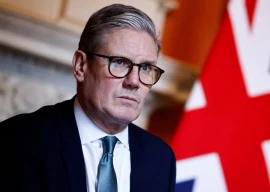
Amid rising tensions between Washington and Moscow over the crisis in Ukraine, the head of NATO-led forces in Afghanistan reassured lawmakers that Russia could not hold up a planned troop draw down there.
"I'm absolutely confident we'll be able to" remove all US equipment on schedule, General Joseph Dunford told the Senate Armed Services Committee.
"Even if the Russians cut off one of the avenues?" Senator John McCain asked.
"Yes, senator," Dunford said.
The general said that "we've got resilience in the system and I'm not concerned at all about a loss of the Russian northern distribution network, the Russian piece of that."
Dunford was referring to a network of road and rail routes that pass through Central Asia, the Caucasus and Russia.
The primary supply routes for US forces in Afghanistan still run through Pakistan but the Pentagon set up the alternative channels through Central Asia and Russia after friction with Islamabad triggered border closures.
With the bulk of US and NATO forces due to withdraw by the end of the year, a major drawdown is under way and vast amounts of military hardware are being ferried out across the Pakistan border.
President Barack Obama and lawmakers in Congress are threatening sanctions against Russia over its military intervention in Ukraine's Crimean peninsula, and European Union governments are also weighing possible punitive measures.
Moscow in turn has warned that any sanctions will have a "boomerang" effect on Washington.
September deadline for BSA
Dunford told the same hearing that US forces in Afghanistan will need to have a security accord with Kabul in place by September, otherwise the NATO mission will have to launch a full withdrawal.
The security pact would lay out a legal framework for foreign forces to remain beyond December 2014.
But President Hamid Karzai has so far refused to sign the bilateral security agreement, casting uncertainty over plans to keep a small US-led force in the country beyond the end of this year.
Dunford said the absence of a deal has not yet created logistical problems for the NATO-led force, which includes more than 33,000 US troops. Military planning would become complicated but "manageable" if the delay continued through July and August, he said.
"I would assess the risk of an orderly withdrawal begins to be high in September, and that's simply a function of the tasks that have to be accomplished ..." the general said.
He acknowledged that after Afghan presidential elections are held in April, a run-off vote could extend through the summer months.
"It would be much harder if there's a runoff," he said. "If we have a new president by August, I'm comfortable that we'll be able to maintain the options through that period of time without any difficulty."
The White House has said it is prepared to have no troops left in Afghanistan if Kabul's leaders fail to sign the security pact. But Dunford warned that a total pull-out would weaken Afghan forces, endanger Afghan women and invite a potential revival of al Qaeda militants.
"If we leave at the end of 2014, the Afghan security forces will begin to deteriorate," Dunford warned. "The security environment will begin to deteriorate, and I think the only debate is the pace of that deterioration."
COMMENTS (2)
Comments are moderated and generally will be posted if they are on-topic and not abusive.
For more information, please see our Comments FAQ

















As Special Envoy James Dobbins stated the U.S. will have a significant military presence in Afghanistan after its so-called withdrawal. The U.S. wants to stay long term with permanent military bases because of Afghanistan's vast untapped resources and minerals like REEs ,rare earth elements,which are used for defense systems and technology . Also the U.S. wants to stay because of Afghanistan's strategic location next to China, Russia, Pakistan, Iran and the Caspian Sea region. There are major economic, defense and geopolitical reasons why the U.S. plans to stay and continue to occupy Afghanistan. The U.S. knew about these vast resources ( REEs) before 9/11. The U.S. put things into motion in the 1980s and 1990s so that it could invade and occupy. It really is not about terrorism. It is about more division of Afghans, of Muslims and not about peace and unity. That is what the U.S. government and west wants to happen in countries with vast natural resources such as oil and REEs and a Muslim majority so that they can invade, intervene and have a military presence and ultimately control those countries' governments. It is about imperialism and rebuilding and shifting the U.S. outer defense perimeter to Central Asia after the fall of the Soviet Union in 1989 and the end of the Cold War. Unfortunately, the majority of Afghans have to suffer again because of the games of the superpowers . Muslims all over the world in Asia, Africa and the Middle East have to suffer . Good people all over the world have to suffer because of this interference which starts with the CIA stirring the pot and causing division . History has shown Afghans never surrender and always fight for their independence. History has also shown the Afghans do not accept puppet leaders
Why would Russia even want to disrupt US withdrawal? US is not leaving Afghanistan in any blaze of glory. It has only added Afghanistan to a long list of wars it may not have lost but certainly did not win in the public perception. At present, it is engaged in three places, Syria, Ukraine, Iran, in any of which it dare not start a war. In fact, it is proposed to reduce US armed forces active duty personnel. Not a pretty picture!